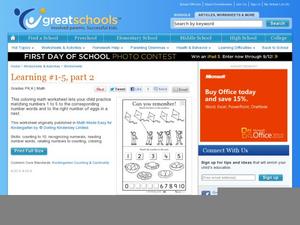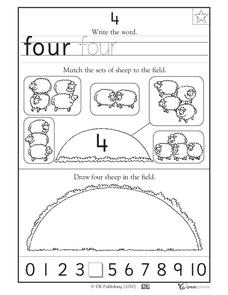Curated OER
What's in Front?
Front and back are common prepositions. Early readers will practice understanding relative positions while using common prepositions by placing a check next to objects in front. Then they draw a cat in front of the house. Tip: Discuss...
DK Publishing
What's Inside?
Is it inside or outside? Learners follow directions by placing a check next to the items that are located inside. They then draw a circle inside the box. This is a great way to introduce the concepts of relative position and prepositions...
Curated OER
Behind
Where is the mouse? Young learners look at eight images featuring a mouse and another object, determining his relative location. Is he behind the object? If he is, they put a check mark in the box. If not, they leave it blank. Encourage...
Curated OER
What's Outside?
Learners determine whether the objects shown are inside or outside. They check the box that is near objects that are located outside of something. They then draw candies outside of a jar.
Curated OER
Report Writing
Why don't dinosaurs wander the earth any longer? Answer this fascinating question with young readers as they examine a brief informational text. There are bolded words to separate text sections which are an excellent example of...
Curated OER
h and m
Make printing practice fun as scholars take on lowercase letters h and m in an artistic way. They connect the dots to trace the letters before copying them in the space provided. There is a scene they complete by tracing sets...
Curated OER
i and t
As emerging printers learn the letters of the alphabet, make it more fun by giving them creative worksheets like this one focused on the lowercase letters i and t. They follow arrows to trace each letter several times...
Curated OER
p and b
Give your beginning printers some kid-friendly practice with the letters p and b that will ignite their artistic side. They connect the dots to trace the lowercase letters before copying them in the space provided. There...
Curated OER
r and n
Here is some kid-friendly practice with the letters r and n that will ignite your scholars' artistic sides. They connect the dots to trace the lowercase letters before copying them in the space provided. There are two...
Curated OER
x and z
Move to the end of the alphabet with some kid-friendly practice focused on the letters x and z that will inspire your scholars' artistic side. They connect the dots to trace the lowercase letters before copying them in the space...
Curated OER
Triangles
Why are there so many different types of triangles? Be that as it may, beginning geometers need to understand the differences between equilateral, isosceles, scalene, and right triangles, and they get a visual approach with this...
DK Publishing
And 3 More Makes...
Addition is easier to grasp when scholars draw the addends as sets of objects. Add three more teacups to each of these four sets, calculating and recording the totals. There are four equations written out without images, each...
Curated OER
And 4 More Makes...
How many will there be if we add four more? Scholars examine sets of sports balls, drawing four more and totaling them. Sums in these four problems don't exceed 10, and the numbers 0-10 are written below for learners to reference as they...
Curated OER
Sorting 2-Dimensional Shapes
Some shapes have square corners, and some do not. Scholars participate in a sorting activity as they determine if these 12 shapes have square corners, categorizing them based on this attribute. Encourage geometers to draw the square into...
Curated OER
Hopping by 2s
Hop to it! Young counters practice skip counting by two using illustrations of animals hopping from place to place. Each image shows a number sequence and scholars draw in the path as they move from number to number. Encourage them to...
Curated OER
Halves
Is it half? There are three sections to this introductory fractions learning exercise focusing on halves. First graders begin by coloring half of five basic shapes, each of which already is divided into two parts. Next, they examine four...
DK Publishing
Sets
Do scholars understand multiplication as sets of numbers? Help them grasp this concept through groups of objects arranged as a makeshift multiplication number sentence. They examine the sets and fill in boxes to indicate how many sets of...
DK Publishing
Can You Remember? Learning #1-5, part 2
Test young counters to see if they can recall the numbers 1, 2, 3, 4, and 5 in both word and numeral form. First, they match word-form kites to number-form children, drawing the tails to the matching counterparts. One is done for them....
DK Publishing
Learning 2 - Write the Word
Focus on the number two with beginning counters as they review its word form, number form, and value. First, learners practice printing the word two, tracing it before writing it once on their own. Next, they draw two bunnies and...
DK Publishing
Learning 4 - Write the Word
Focus on the number four as youngsters complete several exercises to solidify this number concept. Note pre-readers will have a hard time with this, as it requires reading instructions. Consider doing together as a class or...
Curated OER
Learning 5 - Write the Word
As beginning counters learn numbers 1-10, give them activities like this one to help strengthen number value associations and printing skills. They begin by tracing the word five before printing it on their own. Next, they count the...
DK Publishing
Learning 9 - Write the Word
It's a space-themed set of activities focused on the number nine for young counters, who get practice with the word form, number form, and value of this digit. They begin by tracing the word nine and then writing it once themselves....
Curated OER
Symmetry
Is this the line of symmetry? Scholars analyze 12 images to determine whether or not the dotted line in each reflects symmetry. There are three examples for them to reference before they start, so consider reviewing these together before...
Curated OER
Naming Polygons
What polygon is this? Young geometers categorize shapes by circling all the quadrilaterals in a set of figures. Next, they write the names of 10 polygons using a visual guide as reference. Review the guide together before they start if...
Other popular searches
- Scale Drawings
- Grid Drawings
- Isometric Drawings
- Drawings Weather Instruments
- Mitosis Drawings
- Construct Scale Drawings
- Rube Goldberg Drawings
- Cad Drawings
- Chalk Drawings
- Figure Drawings
- Flower Drawings
- Math Vocabulary Drawings























